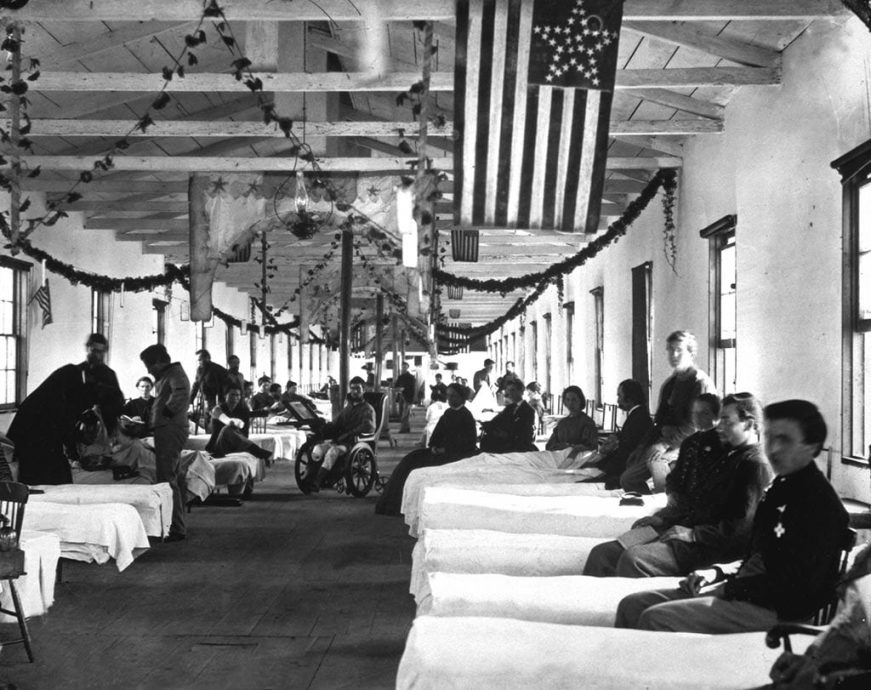If cultural arsonists are to be believed, we’ve lived long enough to see the best of us become the villains.
Service Amid Crisis
It was exactly 160 years ago, on April 12, 1861, that secessionist forces opened fire on South Carolina’s Fort Sumter, igniting the deadliest war in US history, the Civil War, in which perhaps 700,000 soldiers died. The COVID-19 pandemic, though radically different in many ways, has taken US lives on a similar scale—to date, about 550,000. Amid the terrible loss of life, such ordeals offer lessons about living. One such source of insight is also America’s great poet of democracy, Walt Whitman, who devoted more than three years of his life to voluntary service at the bedsides of wounded and dying Civil War soldiers.
The literary critic Harold Bloom famously declared Whitman the “imaginative parent” of all Americans, describing his “Leaves of Grass” as the best candidate for the secular scripture of the United States. What Whitman felt and hoped for the country extended beyond politics into the national imagination, and his own imagination was powerfully shaped by what he experienced tending the sick and wounded. His moving accounts of the war and his personal response to it offer sage counsel to COVID-19-weary Americans looking hopefully to spring for relief from the pandemic’s ravages.
Born in 1819 on Long Island, Whitman spent much of his life in Brooklyn, leaving school at age 11 to help support his family. He eventually found his way to journalism, founding his own newspaper before deciding to become a poet. In 1855, he self-published “Leaves of Grass,” a poetry collection that he continued to revise throughout his life. Six years later, with the outbreak of war, one of his brothers, George, enlisted in the Union cause. When Whitman saw his brother’s name on a list of wounded soldiers in late 1862, he immediately traveled south to find him.
After much searching, Whitman was delighted to find that his brother had suffered only a superficial wound. But during the search, Whitman encountered sights that impressed him deeply—piles of amputated limbs and the plaintive faces of wounded soldiers. Obtaining a part-time position as a paymaster’s clerk in Washington, DC, Whitman resolved to stay in the city, home to numerous military hospitals, where he would devote most of his free time to the care of the wounded. He later wrote, “These three years I consider the greatest privilege and satisfaction, and the most profound lesson of my life.”
What did Whitman do for the patients? He realized that mere medical diagnosis and therapy left vital needs unanswered, especially the need for companionship. The doctors would move quickly from bed to bed, overwhelmed by the number of wounded. Working as a volunteer, by contrast, Whitman could linger at the bedside, listening to his patients, reading them stories, and in some cases, holding their hands. Many, he knew, were adolescents, just 16 or 17 years old, and away from home for the first time in their lives. Their need for medical care was at least equaled by their longing for a friend.
Whitman’s was a ministry of presence. He would work a few hours in the paymaster’s office and then go to the bedside, laboring there for many more. He wrote:
During those three years in hospital, camp or field, I made over six hundred visits or tours, and went, as I estimate counting all, among from eighty thousand to a hundred thousand of the wounded and sick, as sustainer of spirit and body in some degree, in time of need. These visits varied from an hour or two, to all day or night; for with dear or critical cases, I generally watched all night. Sometimes I took up my quarters in the hospital and slept or watched there several nights in succession.
Whitman was sharing some of the most priceless but universal of all resources, his time, attention, and compassion with the ailing, frightened, and often homesick young men of both the Union and Confederate forces.
It is only in the encounter with life’s precariousness that its full preciousness can emerge. The pandemic is such a reminder, and from it, all can learn how to celebrate each day with gratitude.
Although possessed of meagre means, Whitman shared even more. In addition to kind words, he brought whatever trifles he could get his hands on: “all kinds of sustenance, blackberries, peaches, lemons and sugar, wines, all kinds of preserves, pickles, brandy, milk, shirts and all articles of underclothing, tobacco, tea, and handkerchiefs.” Ever the poet, Whitman also brought them paper, envelopes, and stamps, so they could write to their loved ones. For the many who were illiterate and others who did not know what to say, Whitman would take dictation or even write on their behalf.
For one Nelson Jabo, Whitman wrote the following letter to his wife:
You must excuse me for not having written to you before. I have not been very well and did not feel much like writing—but I feel considerably better now—my complaint is an affliction of the lungs. I am mustered out of service but not at present well enough to come home. I hope you will try to write back as soon as you receive this and let me know how you all are, how things are going—let me know how it is with mother. I write this by means of a friend who is now sitting by my side and I hope it will be God’s will that we shall meet again. I send you all my love.
Through newspaper accounts, poems, and essays, Whitman also shared his experiences with a wider audience, helping to ensure that the American public, largely far removed from battle, knew the magnitude of the sacrifices being made on their behalf. Of one young man, he wrote,
I do not know his past life, but I feel as if it must have been good. At any rate what I saw of him here, under the most trying circumstances, with a painful wound, and among strangers, I can say that he behaved so brave, so composed, and so sweet and affectionate, it could not be surpassed. And now like many other noble and good men, after serving his country as a soldier, he has yielded up his young life at the very outset in her service.
Amid the current pandemic, several features of Whitman’s work bear emphasis. One is the fact that he served without formal responsibility or compensation. No one expected him to give up years of his life to the service of complete strangers. There was no job description to which he needed to conform, because, quite simply, it was not his job. And yet he knew it to be his calling—that is, he did it because he felt called to do so. What he witnessed first in searching for his brother and later every day in the military hospitals—the terrible plight of the wounded—moved his heart to action.
Something similar can happen today, amid the pandemic. Even though fear of contagion may render it imprudent or even impermissible to tend to the pandemic’s victims at their bedsides—especially the sickest among them—the opportunity to serve is not foreclosed. The collateral damage of COVID-19 extends far beyond those infected with the virus, and that penumbra offers ample space to answer such a call. For example, the decline in human connectedness brought on by social distancing, isolation, and quarantine places a premium on efforts to reduce loneliness and let people know that someone is thinking about them.
Confronted with the fragility of human life, Whitman did not turn his back but looked it directly in the eye. He found that at the bedside of the sick and dying, he could see death and life more clearly than elsewhere, and it taught him something about what it means to really live, to savor time with another person. Mortality, it seems, is not a bug but a feature of life, and it is only in the encounter with life’s precariousness that its full preciousness can emerge. The pandemic is such a reminder, and from it, all can learn how to celebrate each day with gratitude.
Whitman not only saw but imagined. He imagined a mother in Ohio, receiving the letter bearing news of her soldier son’s death, written in another’s hand. In “Come Up from the Fields Father,” he wrote:
By the jam of a door [she] leans.
But the mother needs to be better,
She with thin form presently drest in black,
By day her meals untouch’d, then at night
fitfully sleeping, often waking,
In the midnight waking, weeping, longing with one deep longing,
O that she might withdraw unnoticed,
silent from life escape and withdraw,
To follow, to seek, to be with her dear
dead son.
The pandemic’s biological, economic, and educational damage has been great. But so, too, is the toll it has taken on the minds, hearts, and spirits of our fellow citizens, neighbors, and human beings. In such circumstances, we need to remember not only the damage we have seen, but the damage that we have not seen, the wounds that cut deeper than flesh. It is not only Whitman’s powers of perception and description that offer opportunities for learning and emulation, but also his moral imagination, from which shines forth the possibility, even amid crisis, of redemption through service.


